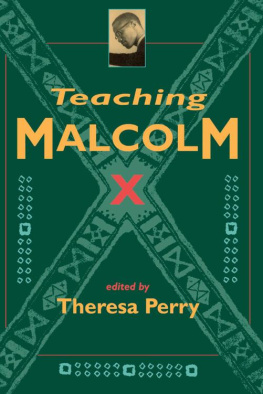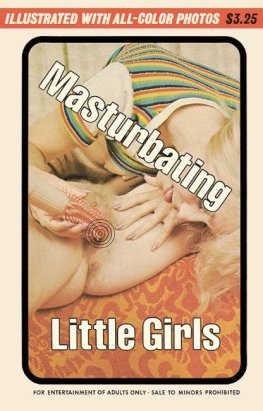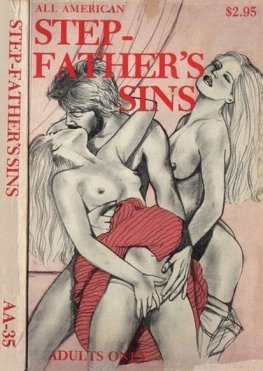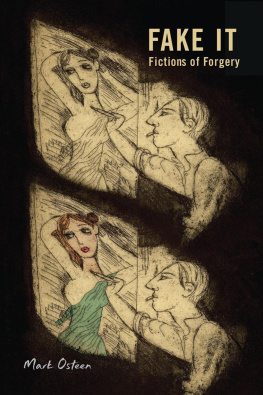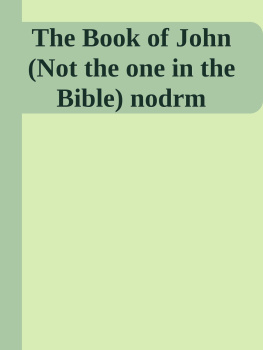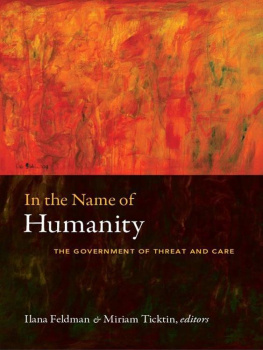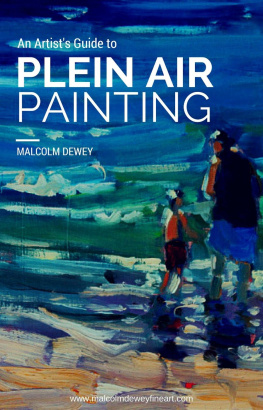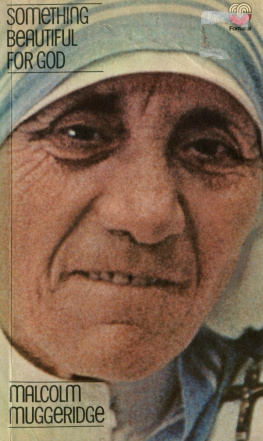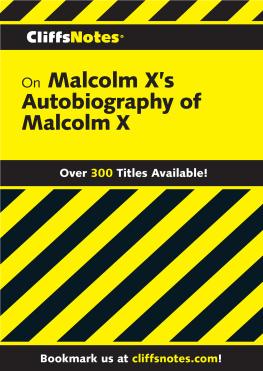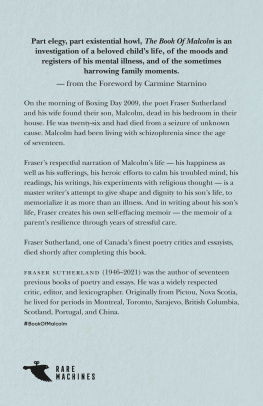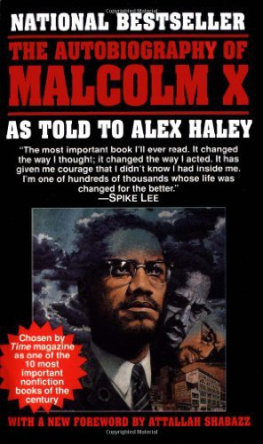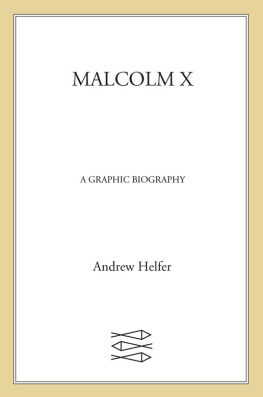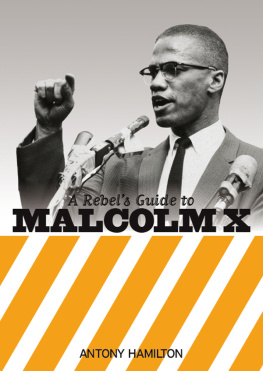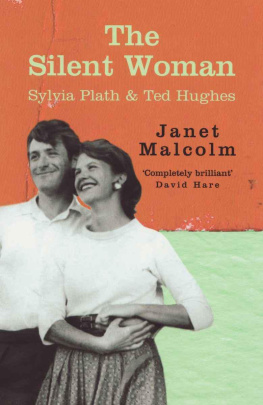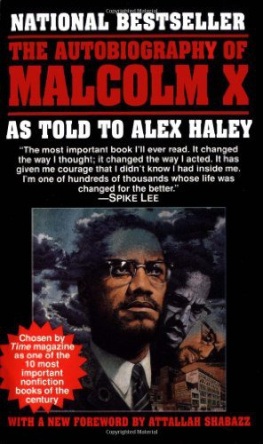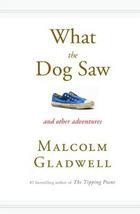Unknown - Teaching Malcolm X
Here you can read online Unknown - Teaching Malcolm X full text of the book (entire story) in english for free. Download pdf and epub, get meaning, cover and reviews about this ebook. year: 2014, publisher: Taylor and Francis, genre: Politics. Description of the work, (preface) as well as reviews are available. Best literature library LitArk.com created for fans of good reading and offers a wide selection of genres:
Romance novel
Science fiction
Adventure
Detective
Science
History
Home and family
Prose
Art
Politics
Computer
Non-fiction
Religion
Business
Children
Humor
Choose a favorite category and find really read worthwhile books. Enjoy immersion in the world of imagination, feel the emotions of the characters or learn something new for yourself, make an fascinating discovery.
Teaching Malcolm X: summary, description and annotation
We offer to read an annotation, description, summary or preface (depends on what the author of the book "Teaching Malcolm X" wrote himself). If you haven't found the necessary information about the book — write in the comments, we will try to find it.
Unknown: author's other books
Who wrote Teaching Malcolm X? Find out the surname, the name of the author of the book and a list of all author's works by series.
Teaching Malcolm X — read online for free the complete book (whole text) full work
Below is the text of the book, divided by pages. System saving the place of the last page read, allows you to conveniently read the book "Teaching Malcolm X" online for free, without having to search again every time where you left off. Put a bookmark, and you can go to the page where you finished reading at any time.
Font size:
Interval:
Bookmark:
edited by Theresa Perry

Firt published in 1996 by
Routledge
Published in Great Britain in 1996 by
Routledge
Published 2013 by Routledge
2 Park Square, Milton Park, Abingdon, Oxon OX14 4RN
605 Third Avenue, New York, NY 10017, USA
Routledge is an imprint of the Taylor & Francis Group, an informa business
Copyright 1996 by Taylor & Francis
ISBN: 978-1-315-02187-4 (eISBN)
DOI: 10.4324/9781315021874
All rights reserved. No part of this book may be reprinted or reproduced or utilized in any form or by any electronic, mechanical, or other means, now known or hereafter invented, including photocopying and recording, or in any information storage or retrieval system without permission in writing from the publishers.
Library of Congress Cataloging-in-Publication Data
Teaching Malcolm X / edited by Theresa Perry.
p. cm.
ISBN 0-415-91154-0 (alk. paper). ISBN 0-415-91155-9 (pbk.: alk. paper)
1. X, Malcolm, 1925-1965 Study and teaching. I. Perry, Theresa.
BP223.Z8L5777 1995
320.5'4'092 dc 20 95-13356
CIP
To African American youth who claim Malcolm X as their cultural hero
Introduction
Situating Malcolm X in the African American Narrative
Tradition Freedom for Literacy and Literacy for Freedom
- Theresa Perry
PART I
Teaching and Talking Malcolm
Teachers and Students on Malcolm X
- Malcolm X: Make It Plain
The Documentary and Book as Educational Materials
- Judy Richardson and James Turner
- Forming the Habit of Seeing for Ourselves, Hearing for Ourselves and Thinking for Ourselves
Teaching Malcolm X to Third and Fourth Graders, an Integrated Approach
- Judith J. Richards
- Javier Brown
- Never So Truly Free
Reading and Writing about Malcolm in the Community College
- Terry Meier
- Linda Mizell and Morin Laraine
- Jabari Brown
- The Meaning of Malcolm
A Conversation with High School Students
- Valdir Barbosa
- Noel Ignatiev
- For the Love of X
Teaching The Autobiography of Malcolm X in an Urban High School Setting
- Sandra Dickerson
- Leonard Lewis Brown
- Malcolm X: Make It Plain
- PART II
Understanding Malcolm X
Text and Content
- Cornel West
- Steve Whitman
- Owusu Yaki Yakubu
- The Perquisites of Whiteness
Lessons from The Autobiography of Malcolm X
- Robert Lowe
- Toasts, Jam, and Libation
How We Place Malcolm X in the Folk Tradition
- Imani Perry
- Learning to Think for Ourselves
Malcolm X's Black Nationalism Reconsidered
- Patricia Hill Collins
- Nikki Giovanni
- Texts and Testimonies
Feminist Notes on the Liberation Narrative of Malcolm X
- Joyce Hope Scott
- Probing a Divided Metaphor
Malcolm X and His Readers
- Michael Eric Dyson
I would like to thank the authors who have contributed to this volume, granting love, thought, and analysis in the spirit of Malcolm X. I also thank my daughter, Imani, and my friends and colleagues who motivated and supported me through the completion of this project.
I would like to acknowledge the authors and presses who have allowed me to reprint previously published materials in Teaching Malcolm X.
: "Malcolm X and Black Rage," by Cornel West, reprinted by permission of the author and the Watkins/Loomis Agency.
: "Learning to Think for Ourselves: Malcolm X's Black Nationalism Reconsidered," by Patricia Hill Collins, reprinted by permission of the author.
: "His Name is Malcolm, by Nikki Giovanni, appeared previously in Racism 101 (1994). Reprinted by permission of William Morrow and Co., New York.
: Probing a Divided Metaphor: Malcolm X and his Readers, by Michael Eric Dyson, appeared previously in The New York Times Book Review, November 29, 1992. Reprinted by permission of the author and the New York Times Company.
Lyrics to "Strange Fruit," quoted in , Malcolm and the Music, are reprinted by permission of the Edward B. Marks Publishing Company.
I am grateful to Nancy Hutchins and Carol Sills Strickland. Without their assistance this book would not have seen the light of day
Finally, a special thanks to Jayne Fargnoli of Routledge Press. Through two projects she has offered challenges, encouragement, and friendship going beyond her responsibilities as an editor.
Freedom for Literacy and Literacy for Freedom
Theresa Perry
DOI: 10.4324/9781315021874-1
About seven years ago, I noticed that images of Malcolm X were beginning to appear in hip-hop videos. On one of my routine trips to Dudley Station, the Black commercial section of Roxbury, Massachusetts, while still mulling over the meaning of the representation of Malcolm X in Black youth culture, several African American teenage boys, clad in typical hip-hop gearover-sized jeans and big hooded jacketscaught my attention. It wasn't the clothesthe familiar dress of my daughter and her friendsthat occasioned a second glance, but the rolled-up copies of The Autobiography of Malcolm X that were stuffed in the pockets of two members of the group.
Suddenly, the image of Malcolm X and his words "by any means necessary" seemed to be everywhereon t-shirts, on posters and in more and more videos. Then came the marketing of Malcolm by Spike Lee, and the infamous "X" cap worn by African Americans of all agesbabies who could barely walk, men and women in their forties and fifties, and of course, members of the hip-hop nation. While Spike Lee, an astute observer of popular culture, may have marketed Malcolm, African American youth are the ones who have claimed Malcolm X, constructing him as their cultural hero.
Since his death, Malcolm X has continued to command a significant following. More than a few veterans of the Civil Rights Movement have gracedor burdenedtheir sons with his name. Just as almost every household in the Black community, regardless of income, has on its coffee table copies of Essence magazine, The Autobiography of Malcolm X is the narrative text most likely to be on their bookshelves. Notwithstanding the marketing of Malcolm X and the silent, persistent vigil kept for him by African Americans and veterans of the Civil Rights Movement, African American youth are the ones who canonized The Autobiography of Malcolm X as the quintessential post-colonial text and the contemporary urban slave narrative.
There are many reasons to edit a collection of essays about teaching Malcolm X. The Autobiography continues to sell and to be read by Americans across racial and ethnic backgrounds. It is as likely to be taught in high schools as in colleges. It can show up on the syllabi of a wide variety of coursesAmerican Literature, African American Literature, the American Autobiography, the Civil Rights Movement, a course on the Black narrative or on the history of the United States. And yet, as suggested in the conversation with high school students included in this volume, the text is read by students "on their own" as often as it is read in school.
Font size:
Interval:
Bookmark:
Similar books «Teaching Malcolm X»
Look at similar books to Teaching Malcolm X. We have selected literature similar in name and meaning in the hope of providing readers with more options to find new, interesting, not yet read works.
Discussion, reviews of the book Teaching Malcolm X and just readers' own opinions. Leave your comments, write what you think about the work, its meaning or the main characters. Specify what exactly you liked and what you didn't like, and why you think so.

